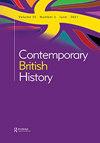我也是吗?从以后生活的角度重新审视战后英国青少年的性暴力经历
IF 0.5
2区 历史学
Q1 HISTORY
引用次数: 2
摘要
摘要自20世纪60年代以来,英国对性虐待、性骚扰和性侵犯的文化理解发生了很大变化,而且范围更广。本文调查了英国女性在讲述20世纪60年代和70年代初年轻时的经历时,如何在晚年驾驭围绕性虐待、性骚扰和性侵犯的不断变化的话语。它确定了六个与了解妇女如何讲述性暴力经历有关的青年场所:家;学校当地户外场所;工作场所;异性恋亲密关系;独立旅行。这些网站与“女孩对女人”登记册上的不同点相关联,追溯了从少女时代的不成熟,到年轻女性的临界状态,再到成熟的路径。受访者在这本登记册上的定位反映了他们如何在不同的网站上理解年轻时的自己,以及他们过去不受欢迎的性关注的经历。尽管性别不平等被认为限制了妇女在青年时期的教育和就业机会,但令人惊讶的是,在性暴力的叙述中却没有这种情况。在处理这种缺席的过程中,我们认为,女性在如何驾驭不断变化的文化话语方面所面临的风险是讲述一个具有代理性和道德责任感的自己。本文章由计算机程序翻译,如有差异,请以英文原文为准。
Me Too? Re-encountering youth experiences of sexual violence in post-war England from the vantage point of later life
ABSTRACT Cultural understandings of sexual abuse, sexual harassment and sexual assault have shifted considerably since the 1960s in the United Kingdom and more widely. This article investigates how changing discourses around sexual abuse, harassment and assault are navigated by British women in later life when they narrate experiences that occurred in their youth in the 1960s and early 1970s. It identifies six sites of youth that are relevant to understanding how women narrate experiences of sexual violence: home; school; local outdoor places; workplaces; heterosexual intimacies; independent travel. These sites are associated with different points on a ‘girl to woman’ register, tracing a pathway from the immaturity of girlhood, through the liminal state of young womanhood, into maturity. How interviewees positioned themselves on this register reflects how they understood their youthful selves in different sites, and their past experiences of unwanted sexual attentions. While gender inequality is understood to have limited women’s education and employment opportunities in youth, it is surprisingly absent from narratives of sexual violence. In attending to this absence, we argue that what is at stake for the women in how they navigate shifting cultural discourses is narrating a version of themselves that is agentic and morally responsible.
求助全文
通过发布文献求助,成功后即可免费获取论文全文。
去求助
来源期刊

Contemporary British History
HISTORY-
CiteScore
1.40
自引率
14.30%
发文量
34
期刊介绍:
Contemporary British History offers innovative new research on any aspect of British history - foreign, Commonwealth, political, social, cultural or economic - dealing with the period since the First World War. The editors welcome work which involves cross-disciplinary insights, as the journal seeks to reflect the work of all those interested in the recent past in Britain, whatever their subject specialism. Work which places contemporary Britain within a comparative (whether historical or international) context is also encouraged. In addition to articles, the journal regularly features interviews and profiles, archive reports, and a substantial review section.
 求助内容:
求助内容: 应助结果提醒方式:
应助结果提醒方式:


